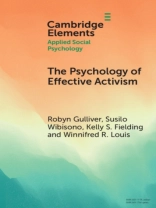This Element reviews the social psychology of effective collective action, highlighting the importance of considering activists’ goals, timeframes, and psychological perspectives in seeking to conceptualise this construct. A novel framework ‘ABIASCA’ maps effectiveness in relation to activists’ goals for mobilisation and change (Awareness raising; Building sympathy; turning sympathy into Intentions; turning intentions into Actions; Sustaining groups over time; Coalition-building; and Avoiding opponents’ counter-mobilisation). We also review the DIME model of Disidentification, Innovation, Moralization and Energization, which examines the effects of failure in creating trajectories of activists’ disidentification from collective action; innovation (including to radicalisation or deradicalisation); and increased moral conviction and energy. The social psychological drivers of effective collective action for four audiences are examined in detail, in four sections: for the self and supporters, bystanders, opponents, and for third parties. We conclude by highlighting an agenda for future research, and drawing out key messages for scholars.
Kelly S. Fielding & Robyn Gulliver
Psychology of Effective Activism [EPUB ebook]
Psychology of Effective Activism [EPUB ebook]
Koop dit e-boek en ontvang er nog 1 GRATIS!
Taal Engels ● Formaat EPUB ● ISBN 9781108986328 ● Uitgeverij Cambridge University Press ● Gepubliceerd 2021 ● Downloadbare 3 keer ● Valuta EUR ● ID 7908382 ● Kopieerbeveiliging Adobe DRM
Vereist een DRM-compatibele e-boeklezer












